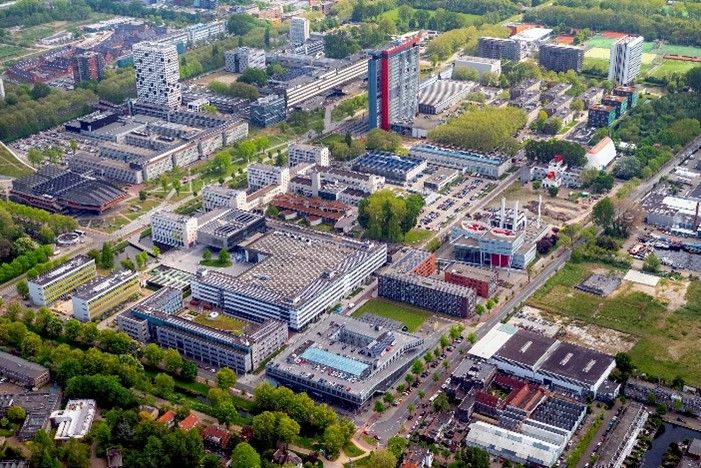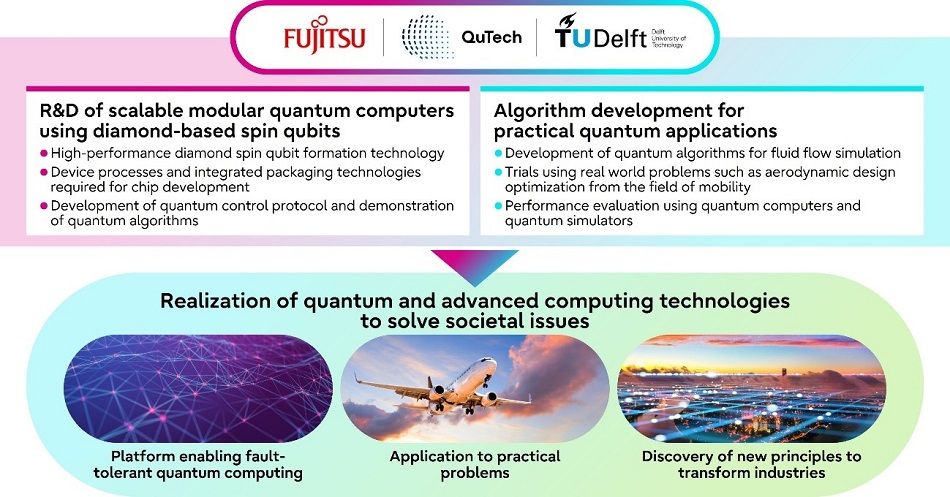Industry-academia collaboration hub Fujitsu Advanced Computing Lab Delft at Delft University of Technology to drive development of advanced quantum computing technologies
Fujitsu and Delft University of Technology announced the establishment of the Fujitsu Advanced Computing Lab Delft at Delft University of Technology, an industry-academia collaboration hub dedicated to the development of quantum computing technologies. The new collaboration hub will be positioned as part of the Fujitsu Small Research Lab initiative, which dispatches Fujitsu researchers to technology incubators at leading global universities to conduct joint research with some of the top researchers in their fields, including professors as well as the next generation of innovators.
Read More : Equinix Announces Fully Managed Service for NVIDIA DGX AI Supercomputing

The Advanced Computing Lab will be established at world-leading quantum technology research institute QuTech (2) – a collaboration between Delft University of Technology and the Netherlands Organization for Applied Scientific Research (TNO) – and aims to accelerate R&D of diamond-spin quantum computing, a technology that Fujitsu and Delft University of Technology have been jointly researching since October 2020.
In addition, the two partners will further advance the development of real-world quantum applications, and aim to realize innovative fluid simulation technologies that apply quantum computing to the field of computational fluid dynamics, where large-scale and complex computations represent an ongoing challenge.
Vivek Mahajan, SEVP, CTO and CPO, Fujitsu Limited, comments:
“Strengthening our collaboration with Delft University of Technology offers a chance to unlock new possibilities in quantum. With Fujitsu’s top-class technologies and talented researchers from one of world’s leading institutions in this exciting field, we can further work toward potential breakthroughs in quantum hardware development, while nurturing a new generation of innovators.”
Prof. Tim van der Hagen, Rector Magnificus/President of the Executive Board at Delft University of Technology, comments:
“At Delft University of Technology, we develop and deliver technology-driven, innovative solutions to societal problems and explore potential applications of quantum computers in a broad range of fields. TU Delft is the ideal place for industry and science to collaborate on advancing this key technology. We are very proud that Fujitsu, building on their already successful collaboration with QuTech, has chosen the Netherlands and Delft to establish their Advanced Computing Lab.”
Dr. Shintaro Sato, Fellow SVP & Head of Quantum Laboratory at Fujitsu Research, Fujitsu Limited, comments:
“We have been working closely with Delft University of Technology on diamond spin qubit technology for the past three years—I am proud of what we have achieved together so far, and I am confident that this new lab will form the foundation for fruitful future collaboration. We are excited to extend this collaboration deeper into the field of quantum applications, and hopefully produce results that surprise the world.”
Kees Eijkel, Director of Business Development at QuTech, Delft University of Technology, comments:
“At QuTech we build scalable technologies for Quantum Computing and a Quantum Internet. We value our strategic partnership with Fujitsu in Quantum Computing. It is a partnership that is founded on our complementary strengths and a shared vision for economic impact. We are very proud that Fujitsu has chosen Delft, with its exceptional concentration of quantum talent, as the location for the Advanced Computing Lab. We are excited about the prospect of extending our already deep and significant collaboration to additional opportunities that Delft presents.”
Read More : Equinix Announces Fully Managed Service for NVIDIA DGX AI Supercomputing
Collaboration to focus on diamond-spin quantum technology
As part of efforts to strengthen collaboration with cutting-edge research institutions through global open innovation, Fujitsu has been conducting basic research and development into quantum computers using diamond-based spin qubits with TU Delft.
To date, the two partners have been conducting R&D on quantum computers using diamond-based spin qubits with the aim to create a blueprint for future modular quantum computers that can scale beyond 1,000 qubits. To make practical quantum computing a reality, Fujitsu and Delft University of Technology have been conducting research on associated technology layers, from the device level to control systems, architecture and algorithms. As a result, the two partners realized the world’s first fault-tolerant operation of spin qubits in a diamond quantum processor (3) using the diamond NV center (4) method.
Fujitsu and Delft University of Technology are further working to improve the performance of qubits by integrating SnV centers (5), which are gaining increasing attention as high-performance diamond spins, in scalable nanophotonic devices showing efficient single-photon coupling.
The two partners have established the Fujitsu Advanced Computing Lab Delft to further strengthen their cooperation and enhance the collaboration and research framework for the development of advanced computing technologies based on quantum technologies. Moving forward, Fujitsu and Delft University of Technology will position the new hub as a leading industry-academia research and development center in Japan and the Netherlands, and promote further collaboration including the development of talent that is able to lead the development of solutions to societal issues using advanced computing technologies.
(1) Basic R&D of quantum computers using diamond-based spin qubits
– Development of a blueprint for scalable modular quantum computing using diamond-spin qubits with both high stability and optical connectivity.
– Verification of the effectiveness of the above approach by demonstrating operation of quantum algorithms using a small number of diamond spin qubits, and by establishing devices and integrated process technologies necessary for on-chip implementation
(2) Research on the application of quantum computing technology to the field of computational fluid dynamics
– Development of applications that enable large-scale, high-speed and complex computations in the fluid dynamics field
– Development of quantum algorithms for fluid dynamics simulations under various conditions and verification of their effectiveness through demonstrations using real-world problems including aerodynamic design for next-generation aircrafts
– Realization of an innovative fluid simulation technology for fault-tolerant quantum computation (FTQC) (6) that enables highly accurate prediction of particle motion over a wide spatial area required for solving real-world problems; expansion of scope of research to strengthen peripheral technologies necessary for practical applications
4. Roles and responsibilities:
(1) Basic R&D of quantum computers using diamond-based spin qubits
– Fujitsu:R&D of implementation technology required for the construction of quantum computing systems
– Delft University of Technology:Proof-of-principle tests of qubit devices and R&D of quantum control protocols
(2) Research on the application of quantum computing technology to the field of computational fluid dynamics (CFD)
– Fujitsu:
Performance evaluation and demonstration trials for real-world problems on quantum computer simulators and early-FTQC systems
– Delft University of Technology:
Development and implementation of a high-performance quantum-CFD solver , construction of a hybrid quantum-classical computational framework for aerodynamic design optimization

5. Organization:Researchers from Fujitsu and Delft University of Technology will support activities at the new collaboration hub. Main members include:
– Dr. Shintaro Sato (Fellow SVP & Head of Quantum Laboratory at Fujitsu Research, Fujitsu Limited)
– Kenichi Kawaguchi (Research Director, Quantum Hardware Core Project, Quantum Laboratory at Fujitsu Research, Fujitsu Limited)
– Shinji Kikuchi (Senior Project Director, Quantum Application Core Project, Quantum Laboratory at Fujitsu Research, Fujitsu Limited)
– Matthias Möller (Associate Professor, Faculty of EEMCS, Delft University of Technology)
– Ronald Hanson (Professor, QuTech, Delft University of Technology)
– Tim Taminiau ( Group Leader, QuTech, Delft University of Technology)
– Ryoichi Ishihara (Associate Professor, QuTech, Faculty of EEMCS, Delft University of Technology)
[1] Fujitsu Small Research Lab :An initiative to achieve greater breakthroughs beyond the results of ordinary joint research. The initiative aims to contribute to the solution of social issues, while accelerating joint research, identifying new research themes, developing human resources, and building medium- to long-term relationships with universities. Fujitsu researchers are embedded at technology incubators at universities in Japan and internationally.
[2] QuTech :Formally established in 2015 by Delft University of Technology and the Netherlands Organization for Applied Scientific Research (TNO). QuTech’s mission is to develop a scalable prototype of a quantum computer and an inherently secure quantum Internet based on the fundamental laws of quantum mechanics.
[3] The world’s first fault-tolerant operation of spin qubits in a diamond quantum processor :“QuTech and Fujitsu realise the fault-tolerant operation of a qubit” (QuTech press release May 5, 2022): Abobeih et al., “Fault-tolerant operation of a logical qubit in a diamond quantum processor,” Nature, DOI: 10.1038/s41586-022-04819-6
[4] Diamond NV Center :A defect consisting of a vacancy in the diamond lattice next to a nitrogen atom, where a carbon atom is typically found.
[5] SnV Center :A defect consisting of a vacancy in the diamond lattice next to a tin (Sn), where a carbon atom is typically found.
[6] FTQC :Abbreviation for fault-tolerant quantum computation; performance of quantum computation without errors while correcting quantum errors.
Read More: Lenovo’s Tech Updates Weekly Roundup
[To share your insights with us as part of editorial or sponsored content, please write to sghosh@martechseries.com]


